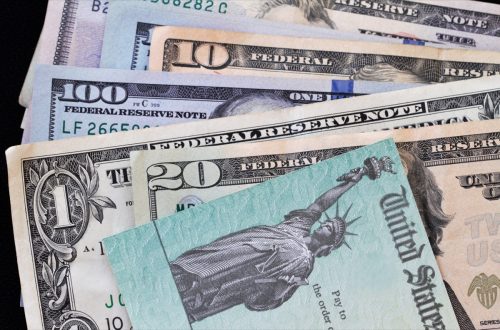The IRS Warns You’ll Be Charged More for This Starting April 1

There are few bigger shocks than spotting the amount of taxes taken out of your check every payday. The average person in the U.S. will end up paying more than $525,000 just in taxes throughout their lifetime, according to the financial technology company Self Financial. And during the tax season—which is currently underway—you could find yourself owing even more in taxes when you file your return for a number of different reasons, from extra income to changes in your family structure from year to year. Now, the IRS is warning that taxpayers could get charged more for one particular thing, starting in April. Read on to find out what you should start preparing for in the next month.
RELATED: The IRS Warns You Have to File by March 1 If You Did These 2 Things.
The IRS is increasing its interest rates in April.

The IRS sent out a notice on Feb. 23, warning taxpayers about a price hike coming in the next few months. The tax agency said that interest rates will increase for the calendar quarter starting April 1, 2022. You can accrue interest on two types of payments: overpayment or underpayment. So starting in April, overpayments will have an interest rate of 4 percent, except for corporations which will earn a 3 percent rate and a 1.5 percent rate for the portion of a corporate overpayment that exceeds $10,000. In terms of underpayments, the interest rate will increase to 4 percent overall and 6 percent for large corporate underpayments.
“Under the Internal Revenue Code, the rate of interest is determined on a quarterly basis,” the IRS explains. The tax agency did not change interest rates in this last quarter, which began Jan. 1, 2022. Before they get changed in April, the rates are currently 3 percent for general overpayments and 2 percent for corporation overpayments, with a 0.5 percent rate for the portion of a corporate overpayment exceeding $10,000. The underpayment interest is 3 percent right now, expect for large corporations which have a 5 percent rate.
This could mean you might have to pay the IRS more money.

If you’re facing interest on an underpayment, you will be charged more for it once April 1 hits. The IRS charges underpayment interest when you don’t pay your tax, penalties, additions to tax, or interest by the due date. In terms of the tax you owe, “the underpayment interest applies even if you file an extension,” the tax agency warns on its website. The deadline for filing 2021 tax returns and paying tax for most taxpayers is April 18.
On the other hand, the date by which you have to pay penalties and additions to your taxes in order to avoid building up interest might vary based on your penalty. According to the IRS, both the Failure to File penalty and accuracy-related penalties are due on the return due date or extended return due date. Failure to Pay, estimated tax, and Dishonored Check penalties are due on the date the tax agency sends you a notice or assesses the penalty.
“If you received a notice, you will not be charged interest on the amount shown if you pay the amount you owe in full on or before the ‘pay by’ date,” the IRS says.
RELATED: For more financial advice delivered straight to your inbox, sign up for our daily newsletter.
But the tax agency could also end up owing you.

Rising interest rates aren’t all bad news, however. If you’re facing an overpayment, the IRS might end up owing you more money. The tax agency will pay interest if you overpay, starting from either your tax return filing due date, a late filed tax return received date, the date they get your return in a format they can process, or the date the payment was made—whichever date occurs last.
There is one exception. If the IRS issues you the refund for your overpayment within its set administrative time (which is usually 45 days), they might not have to pay interest on it. “We stop paying interest on overpayments on the date we refund your overpayment (and interest) or offset it to an outstanding liability,” the agency notes.
If you owe interest to the IRS, you might be able to get it reduced.

When it comes to owing underpayment interest to the IRS, the best course of action is just to pay it in full. According to the tax agency, your interest will stop accumulating daily once you pay your entire balance. If you’re unable to pay the full amount of your taxes on time, the IRS advises that you pay what you can and then apply for a payment plan.
You do also have the option to potentially reduce the interest you owe. Filing an amended return or qualifying for penalty relief can lower the amount of tax or penalties you owe, which in turn, will result in the IRS automatically reducing any related interest. “We don’t remove or reduce interest for reasonable cause or as first-time relief,” the agency warns.
The IRS might also “reduce the amount of interest you owe only if the interest is applied because of an unreasonable error or delay by an IRS officer or employee.” But in order to receive this reduction, you will need to dispute the interest you owe by submitting Form 843 or sending the IRS a signed letter requesting they reduce or adjust overcharged interest.
RELATED: The IRS Just Warned Taxpayers to Never Take This Deduction.